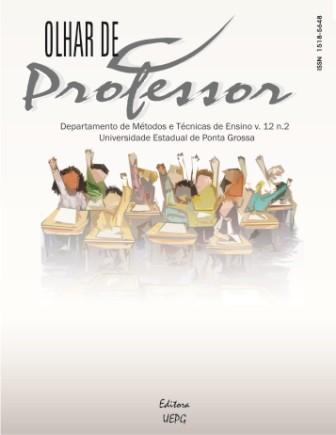DEZ NOTAS SOBRE ALFABETIZAÇÃO E LETRAMENTO - Doi: http://dx.doi.org/10.5212/OlharProfr.v.12i2.379388
Conteúdo do artigo principal
Resumo
O presente texto busca apresentar algumas reflexões sobre processos de alfabetização e letramento, que num país como o Brasil, com alto índice de analfabetismo, é muitas vezes realizado em programas emergenciais, quase sempre no âmbito da educação popular. Embora trate de temas centrais nessa discussão, como conceito de alfabetização, métodos de ensino, políticas educacionais, seu foco é a necessidade de maior aproximação entre os diferentes níveis educacionais, em especial a pós-graduação e o período de aquisição da língua escrita, ocorrido na infância ou em projetos de educação de jovens e adultos. Entre outros aspectos, o texto propõe a ideia de que a má qualidade da educação no país não se deve a um setor exclusivamente (seja ele governo, professores, família ou alunos) e que, portanto, a reversão dessa situação deve se dar por um trabalho cooperativo entre essas instâncias, incluída aí a universidade.
Downloads
Detalhes do artigo
Autores que publicam nesta revista concordam com os seguintes termos:
a) Os autores mantêm os direitos autorais e concedem à revista o direito de primeira publicação, com o trabalho simultaneamente licenciado sob a Creative Commons Attribution License Atribuição 4.0 Internacional (CC BY 4.0) que permite o compartilhamento do trabalho com reconhecimento da sua autoria e publicação inicial nesta revista.
b) Os autores são autorizados a assinarem contratos adicionais, separadamente, para distribuição não exclusiva da versão publicada nesta revista (por exemplo, em repositórios institucionais ou capítulos de livros), com reconhecimento da sua autoria e publicação inicial nesta revista).
c) Os autores são estimulados a publicar e distribuir a versão onlline do artigo (por exemplo, em repositórios institucionais ou em sua página pessoal), considerando que isso pode gerar alterações produtivas, bem como aumentar o impacto e as citações do artigo publicado.
d) Esta revista proporciona acesso público a todo o seu conteúdo, uma vez que isso permite uma maior visibilidade e alcance dos artigos e resenhas publicados. Para maiores informações sobre esta abordagem, visite Public Knowledge Project, projeto que desenvolveu este sistema para melhorar a qualidade acadêmica e pública da pesquisa, distribuindo o OJS assim como outros softwares de apoio ao sistema de publicação de acesso público a fontes acadêmicas.
e) Os nomes e endereços de e-mail neste site serão usados exclusivamente para os propósitos da revista, não estando disponíveis para outros fins.
______________

Este obra está licenciado com uma Licença Creative Commons Atribuição 4.0 Internacional.





